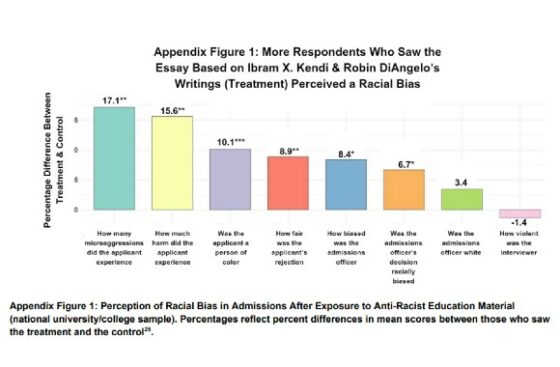
Research institute questions New York Times’ decision to dump article about findings
Two major news outlets reportedly dumped stories about a new study that questions the effectiveness of diversity, equity, and inclusion training, according to National Review.
Reporters at the New York Times and Bloomberg both worked on articles about the Rutgers University study, published Monday, but neither news outlet published their pieces, the report states.
The study, “Instructing Animosity: How DEI pedagogy produces the hostile attribution bias,” found that “instead of reducing bias,” these trainings “engendered a hostile attribution bias.” The research came from the Network Contagion Research Institute and Rutgers Social Perception Lab.
As National Review reports:
The study examined whether the themes and materials common in DEI trainings foster inclusion or exacerbate conflicts, and whether such materials promote empathy or increase hostility towards groups labeled as oppressors. The study consisted of three experiments — one focusing on race, one on religion, and the last on caste.
Although proponents of DEI trainings claim that they are designed to educate individuals about biases and reduce discrimination, the study found that participants primed with DEI materials were more likely to perceive prejudice where none existed and were more willing to punish the perceived perpetrators. In one experiment, the DEI materials made people more willing to agree with Hitler quotes that substituted “Jew” with “Brahmin,” the highest caste in the Indian caste system.
Part of the study involved “educational texts from prominent DEI scholars” Robin DiAngelo, a professor at the University of Washington, and Ibram Kendi, who runs the Center for Antiracist Research at Boston University.
The scholars’ “anti-racist” writings “influenced participants to impute bias without evidence” and made them more willing to “punish perceived perpetrators,” according to the study.
DEI trainings can “engender a hostile attribution bias and heighten racial suspicion, prejudicial attitudes, authoritarian policing, and support for punitive behaviors in the absence of evidence for a transgression deserving punishment,” according to the study.

Initially, reporters at Bloomberg and the New York Times expressed interest in writing about the findings, according information the Network Contagion Research Institute provided to National Review.
However, their stories were “inexplicably pulled at the highest editorial levels,” an institute researcher told National Review. “This has never happened to the NCRI in its 5 year history.”
The report continues:
Two reporters at Bloomberg had agreed to cover the study and wrote an article. One of the journalists had described the coverage as “an important story” in communications with the NCRI and expressed being “eager” to publish the article; that journalist had further stated on November 11 that the article should be published in the next few days.
However, an editor — Nabila Ahmed, the team leader for Global Equality at Bloomberg News who “lead[s] a global team of reporters focused on stories that elevate issues of race, gender, diversity and fairness within companies, governments and societies” — informed the NCRI on November 15 that Bloomberg would not go forward with the article.
NCRI later was told it was an “editorial decision,” according to the report
Similarly, editors at the New York Times decided against publishing an article about the study, National Review reports:
Although the reporter disclosed that he did not have “any concerns about the methodology” and that someone at the Times’ “data-driven reporting team” had “no problems” with the study, he stated that he had concluded the study wasn’t strong enough after speaking with an editor.
“The piece was reported and ready for publication, but at the eleventh hour, the New York Times insisted the research undergo peer review after discussions with editorial staff — an unprecedented demand for our work,” an NCRI researcher told National Review. “The journalist involved had previously covered far more sensitive NCRI findings, such as our QAnon and January 6th studies, without any such request.” …
“Our journalists are always considering potential topics for news coverage, evaluating them for newsworthiness, and often choose not to pursue further reporting for a variety of reasons,” a spokesperson for the New York Times told National Review. “Speculative claims from outside parties about The Times’s editorial process are just that.”
Both Kendi and DiAngelo have been the subject of recent College Fix reports.
Earlier this fall, a complaint filed with the University of Washington alleged DiAngelo, a white critical race theorist, plagiarized minority scholars and others in her dissertation, The Fix reported.
Meanwhile, a College Fix analysis in September found Kendi’s Center for Antiracist Research appears to be inactive.
Diversity, equity, and inclusion programs are facing increased scrutiny in higher education, and some states have moved to ban DEI offices and hiring pledges at public colleges and universities.
MORE: DEI scholar avoids plagiarism sanctions
IMAGE: Dmitry Demidovich/Shutterstock, Network Contagion Research Institute
Like The College Fix on Facebook / Follow us on Twitter






Please join the conversation about our stories on Facebook, Twitter, Instagram, Reddit, MeWe, Rumble, Gab, Minds and Gettr.